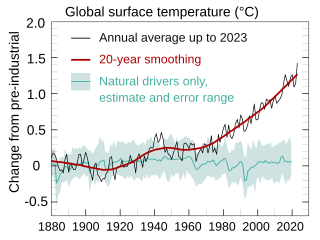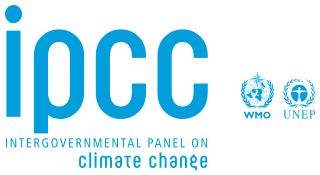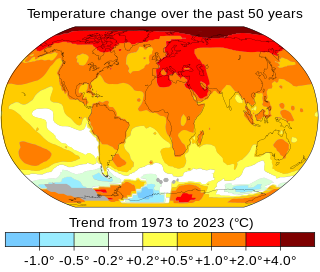Related Research Articles

Attribution of recent climate change is the effort to scientifically ascertain mechanisms responsible for recent global warming and related climate changes on Earth. The effort has focused on changes observed during the period of instrumental temperature record, particularly in the last 50 years. This is the period when human activity has grown fastest and observations of the atmosphere above the surface have become available. According to the Intergovernmental Panel on Climate Change (IPCC), it is "extremely likely" that human influence was the dominant cause of global warming between 1951 and 2010. Likely human contribution is 93%–123% of the observed 1951–2010 temperature change.

The global warming controversy concerns the public debate over whether global warming is occurring, how much has occurred in modern times, what has caused it, what its effects will be, whether any action can or should be taken to curb it, and if so what that action should be. In the scientific literature, there is a strong consensus that global surface temperatures have increased in recent decades and that the trend is caused by human-induced emissions of greenhouse gases. No scientific body of national or international standing disagrees with this view, though a few organizations with members in extractive industries hold non-committal positions, and some have attempted to convince the public that climate change is not happening, or if the climate is changing it is not because of human influence, attempting to sow doubt in the scientific consensus.

The Intergovernmental Panel on Climate Change (IPCC) is an intergovernmental body of the United Nations responsible for advancing knowledge on human-induced climate change. It was established in 1988 by the World Meteorological Organization (WMO) and the United Nations Environment Programme (UNEP), and later endorsed by United Nations General Assembly. Headquartered in Geneva, Switzerland, it is comprised of 195 member states.

The instrumental temperature record provides the temperature of Earth's climate system from the historical network of in situ measurements of surface air temperatures and ocean surface temperatures.

There is a strong scientific consensus that the Earth is warming and that this warming is mainly caused by human activities. This consensus is supported by various studies of scientists' opinions and by position statements of scientific organizations, many of which explicitly agree with the Intergovernmental Panel on Climate Change (IPCC) synthesis reports.

Sea surface temperature (SST), or ocean surface temperature, is the water temperature close to the ocean's surface. The exact meaning of surface varies according to the measurement method used, but it is between 1 millimetre (0.04 in) and 20 metres (70 ft) below the sea surface. Air masses in the Earth's atmosphere are highly modified by sea surface temperatures within a short distance of the shore. Localized areas of heavy snow can form in bands downwind of warm water bodies within an otherwise cold air mass. Warm sea surface temperatures are known to be a cause of tropical cyclogenesis over the Earth's oceans. Tropical cyclones can also cause a cool wake, due to turbulent mixing of the upper 30 metres (100 ft) of the ocean. SST changes diurnally, like the air above it, but to a lesser degree. There is less SST variation on breezy days than on calm days. In addition, ocean currents such as the Atlantic Multidecadal Oscillation (AMO), can effect SST's on multi-decadal time scales, a major impact results from the global thermohaline circulation, which affects average SST significantly throughout most of the world's oceans.
Thomas R. Karl is the former director of the National Oceanic and Atmospheric Administration’s National Centers for Environmental Information (NCEI). He joined the National Climate Centre in 1980, and when that became the National Climatic Data Center, he continued as a researcher, becoming a Lab Chief, Senior Scientist and ultimately Director of the Center. When it merged with other centers to become NCEI in 2015, he became its first director. He retired on 4 August 2016.

The National Institute of Water and Atmospheric Research or NIWA, is a Crown Research Institute of New Zealand. Established in 1992, NIWA conducts research across a broad range of disciplines in the environmental sciences. It also maintains nationally and, in some cases, internationally important environmental monitoring networks, databases, and collections.

Human-induced climate change includes both global warming driven by emissions of greenhouse gases and the resulting large-scale shifts in weather patterns. Though there have been previous periods of climatic change, since the mid-20th century humans have had an unprecedented impact on Earth's climate system and caused change on a global scale.
The Global Climate Observing System (GCOS) was established in 1992 as an outcome of the Second World Climate Conference, to ensure that the observations and information needed to address climate-related issues are obtained and made available to all potential users. The GCOS is co-sponsored by the World Meteorological Organization (WMO), the Intergovernmental Oceanographic Commission (IOC) of UNESCO, the United Nations Environment Programme (UNEP), and the International Council for Science (ICSU). In order to assess and monitor the adequacy of in-situ observation networks as well as satellite-based observing systems, GCOS regularly reports on the adequacy of the current climate observing system to the United Nations Framework Convention on Climate Change (UNFCCC), and thereby identifies the needs of the current climate observing system.
David Russell Legates is an American professor of geography at the University of Delaware. He is the former Director of the Center for Climatic Research at the same university and a former Delaware state climatologist. In September 2020, the Trump administration appointed him as deputy assistant secretary of commerce for observation and prediction at the National Oceanic and Atmospheric Administration.

Jean-Pascal van Ypersele de Strihou is a Belgian academic climatologist. He is a professor of Environmental Sciences at the UCLouvain (Belgium). As a previous vice-chair of the IPCC, Van Yp is one of the forerunners of climate change mitigation through strong decrease of fossil fuel consumption.
The following are considered essential ocean climate variables by the Ocean Observations Panel for Climate (OOPC) that are currently feasible with current observational systems.
CLIMAT is a code for reporting monthly climatological data assembled at land-based meteorological surface observation sites to data centres. CLIMAT-coded messages contain information on several meteorological variables that are important to monitor characteristics, changes, and variability of climate. Usually these messages are sent and exchanged via the Global Telecommunication System (GTS) of the World Meteorological Organisation (WMO). Modifications of the CLIMAT code are the CLIMAT SHIP and CLIMAT TEMP / CLIMAT TEMP SHIP codes which serve to report monthly climatological data assembled at ocean-based meteorological surface observation sites and at land-/ocean-based meteorological upper-air observation sites, respectively. The monthly values included usually are obtained by averaging observational values of one or several daily observations over the respective month.
David W. Keith is the Gordon McKay Professor of Applied Physics for Harvard University's Paulson School of Engineering and Applied Sciences (SEAS) and Professor of Public Policy for the Harvard Kennedy School at Harvard University. Early contributions include development of the first atom interferometer and a Fourier-transform spectrometer used by NASA to measure atmospheric temperature and radiation transfer from space. A specialist on energy technology, climate science, and related public policy, and a pioneer in carbon capture and storage, Keith is a founder and board member of Carbon Engineering.

David Stuart Wratt is a New Zealand climate scientist who specialises in meteorology and the science and impact of climate change. He is an Adjunct Research Fellow at the New Zealand Climate Change Research Institute at Victoria University of Wellington, and has had many roles at the National Institute of Water and Atmospheric Research(NIWA), including six years as Chief Scientist Climate. His current position at NIWA is Emeritus Scientist (Climate). Wratt is a companion of the Royal Society of New Zealand and was the Chair of the Society's New Zealand Climate Committee. He has had advisory roles for the New Zealand Government, including Science Advisor at the Ministry for the Environment, and is currently a member of the Science Board for the Ministry of Business, Innovation and Employment. He has had input into assessments by the Intergovernmental Panel on Climate Change (IPCC), notably, contributing to its award of the 2007 Nobel Peace Prize through his contributions to the IPCC Fourth Assessment Report. Wratt has worked in the United States and Australia as well as New Zealand.

The Croatian Meteorological and Hydrological Service is a public entity for meteorology, hydrology and air quality in Croatia.

Microwave Sounding Unit temperature measurements refers to temperature measurement using the Microwave Sounding Unit instrument and is one of several methods of measuring Earth atmospheric temperature from satellites. Microwave measurements have been obtained from the troposphere since 1979, when they were included within NOAA weather satellites, starting with TIROS-N. By comparison, the usable balloon (radiosonde) record begins in 1958 but has less geographic coverage and is less uniform.

A global warming hiatus, also sometimes referred to as a global warming pause or a global warming slowdown, is a period of relatively little change in globally averaged surface temperatures. In the current episode of global warming many such 15-year periods appear in the surface temperature record, along with robust evidence of the long-term warming trend. Such a "hiatus" is shorter than the 30-year periods that climate is classically averaged over.
References
- ↑ "Peter Thorne". Archived from the original on 7 July 2015. Retrieved 7 July 2015.
- ↑ "Peter Thorne". North Carolina State University . Retrieved 30 September 2014.
- ↑ "Next steps in climate science". Royal Society . Retrieved 30 September 2014.
- ↑ "Peter W. Thorne". NERSC. Archived from the original on 20 July 2014. Retrieved 30 September 2014.
- ↑ "International Surface Temperature Initiative". ISTI - Surface temperature .
- ↑ "GCOS Reference Upper Air Network". GRUAN .
- ↑ "GAIA-CLIM Horizon 2020". GAIA-CLIM .
- ↑ IPCC Factsheet: How does the IPCC select its authors?
- ↑ "WORKING GROUP I - Chapter 2". Intergovernmental Panel on Climate Change . Retrieved 30 September 2014.